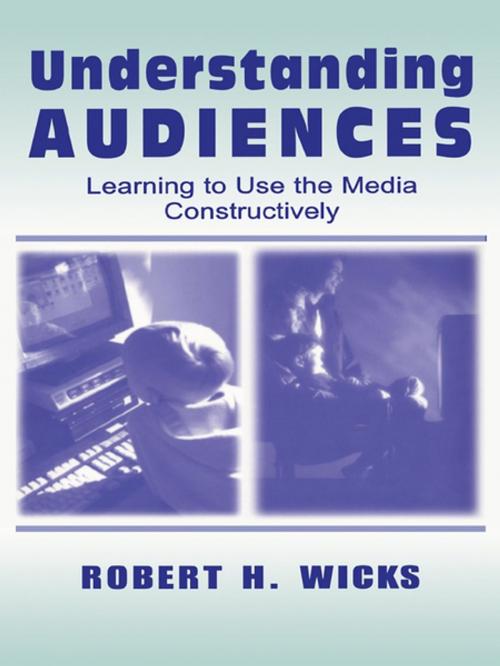Understanding Audiences
Learning To Use the Media Constructively
Nonfiction, Reference & Language, Language Arts, Communication, Business & Finance, Industries & Professions, Industries| Author: | Robert H. Wicks | ISBN: | 9781135656263 |
| Publisher: | Taylor and Francis | Publication: | October 1, 2000 |
| Imprint: | Routledge | Language: | English |
| Author: | Robert H. Wicks |
| ISBN: | 9781135656263 |
| Publisher: | Taylor and Francis |
| Publication: | October 1, 2000 |
| Imprint: | Routledge |
| Language: | English |
Understanding Audiences helps readers to recognize the important role that media plays in their lives and suggests ways in which they may use media constructively. Author Robert H. Wicks considers the relationship between the producers and the receivers of media information, focusing on how messages shape perceptions of social reality. He analyzes how contemporary media--including newspapers, film, television, and the Internet--vie for the attention of the audience members, and evaluates the importance of message structure and content in attracting and maintaining the attention of audiences. Wicks also examines the principles associated with persuasive communication and the ways in which professional communicators frame messages to help audiences construct meaning about the world around them.
Among other features, this text:
* describes the processes associated with human information processing;
* presents an analysis of the principles associated with social learning in children and adults and explores the possibility that media messages may cultivate ideas, attitudes, and criticisms of this perspective;
* explains how most media messages are framed to highlight or accentuate specific perspectives of individuals or organizations--challenging the notion of objectivity in media information messages;
* considers the effects of media exposure, such as whether the contemporary media environment may be partially responsible for the recent rash of school violence among young people;
* analyzes the Internet as an interactive medium and considers whether it has the potential to contribute to social and civic disengagement as it substitutes for human interaction; and
* evaluates the principles of the uses and gratifications approach as they apply to the new media environment, including traditional media as well as popular genres like talk shows and developing media systems such as the Internet.
Intended for upper-level undergraduate and graduate students who need to understand the nature of the media and how they interact with these messages, Understanding Audiences promotes the development of media literacy skills and helps readers to understand the processes associated with engaging them in media messages. It also offers them tools to apply toward the shaping of media in a socially constructive way.
Understanding Audiences helps readers to recognize the important role that media plays in their lives and suggests ways in which they may use media constructively. Author Robert H. Wicks considers the relationship between the producers and the receivers of media information, focusing on how messages shape perceptions of social reality. He analyzes how contemporary media--including newspapers, film, television, and the Internet--vie for the attention of the audience members, and evaluates the importance of message structure and content in attracting and maintaining the attention of audiences. Wicks also examines the principles associated with persuasive communication and the ways in which professional communicators frame messages to help audiences construct meaning about the world around them.
Among other features, this text:
* describes the processes associated with human information processing;
* presents an analysis of the principles associated with social learning in children and adults and explores the possibility that media messages may cultivate ideas, attitudes, and criticisms of this perspective;
* explains how most media messages are framed to highlight or accentuate specific perspectives of individuals or organizations--challenging the notion of objectivity in media information messages;
* considers the effects of media exposure, such as whether the contemporary media environment may be partially responsible for the recent rash of school violence among young people;
* analyzes the Internet as an interactive medium and considers whether it has the potential to contribute to social and civic disengagement as it substitutes for human interaction; and
* evaluates the principles of the uses and gratifications approach as they apply to the new media environment, including traditional media as well as popular genres like talk shows and developing media systems such as the Internet.
Intended for upper-level undergraduate and graduate students who need to understand the nature of the media and how they interact with these messages, Understanding Audiences promotes the development of media literacy skills and helps readers to understand the processes associated with engaging them in media messages. It also offers them tools to apply toward the shaping of media in a socially constructive way.















